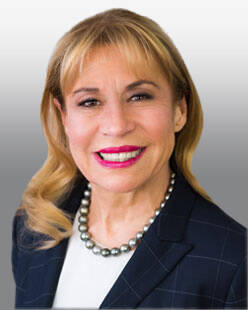
Case Manager: Haward Cho
Hon. Suzanne G. Bruguera (Ret.) joins ADR Services, Inc. after 27 years as a judge of the Los Angeles Superior and former Municipal Courts, with the entirety of her time on the bench spent in civil assignments. Responsible for handling hundreds of cases with unlimited jurisdiction as an independent calendar judge, Judge Bruguera is known for negotiating difficult settlements and for conducting controversial high publicity jury trials. She is a well-respected jurist, known for being firm, fair, and able to settle cases which other settlement officers could not.
Patient, courteous, and respectful, Judge Bruguera’s excellent judicial temperament made her one of the most admired civil trial judges on the bench. Her success as a judge reflects the high regard in which she is held in the legal community, and she has often been recognized for her high level of intellect, sound decision-making, and dedication to each case before her.
Judge Bruguera’s judicial career was preceded by experience as a Deputy Attorney General for the California State Department of Justice, where she handled complex business and tax matters and Medi-Cal fraud for nearly five years. Prior to that, she was a Deputy District Attorney for the County of Los Angeles and spent a year in private practice.
2000 – 2016 Judge, Los Angeles Superior Court
1989 – 2000 Judge, Los Angeles Municipal Court
1984 – 1989 Deputy Attorney General, California State Department of Justice
1983 – 1984 Deputy District Attorney, County of Los Angeles
1982 – 1983 Associate, Voorhees, Knable, & Voorhees
2017 “STAR: A Systematic Approach to Mediation Strategies”, Straus Institute for Dispute Resolution, Pepperdine University (18 hours)
1981 J.D., Loyola Law School
1978 B.S., University of Southern California
Employment
Real Estate
Business & Commercial
Personal Injury
Entertainment
Elder Abuse
Insurance
“Fantastic mediator! Hon. Suzanne Bruguera worked very hard with all the parties to get this case resolved. Although, we did not settle at the mediation itself, she went above and beyond for months to guide the parties towards the resolution. We highly appreciate the hard work in helping us to settle this matter. Thank you! Looking forward to working with Judge Bruguera in the future.”
“Judge Bruguera goes out of her way to get things done in a professional manner and I will be forever grateful on her handling of my client and my client’s daughter on the complexity of the legal process and how she made them feel better. She listened to them, she really listened and gave her thoughts that calmed them both down.”
“Hon. Suzanne Bruguera is a fantastic neutral.”
“Always consistent, attentive to details, diligent, and driven to reach resolution, Judge Bruguera is the best in the game. Nobody does it better. Nobody!”
“Time and time again, Judge Bruguera delivers exceptional effort and unsurpassed knowledge of the law. Her greatest skill is innate. She knows instantly how to connect with people, and how to deliver a difficult message with grace and delicacy. It is by no means accidental that she achieved the reputation as being among the best.”
“Judge Bruguera is truly a remarkable neutral. She is incredibly knowledgeable and thoughtful in how she approaches cases. She provides the “perfect touch” needed to get cases settled. Her approach is like no other that I’ve seen, and it works wonders.”
“She is an absolute asset. Very fair. Very upfront and honest about facts; including the unfavorable ones. Had an incredible amount of skill, strategic thinking, and tact. We will definitely offer her in the mediation panel in future matters.”
“Judge Bruguera is terrific to work with. She is extremely diligent in working to resolve the matter and does so with a pleasant but firm demeanor.”
“We have used ADR Services, Inc. for years across countless mediations. Judge Brugera has proven the most effective. She is smart, well-prepared, and relentless. She has all the qualities anyone could ask for in a mediator and in a person. Simply the best.”
“Judge Bruguera’s knowledge of the law, ability to synthesize massive amounts of data in a short time, and her personal touch are beyond compare. She has a special ability to earn the trust of clients, and the respect of lawyers. I have never worked with a more effective mediator. It is a privilege working with her.”
“Judge Bruguera was amazing and worked very hard to get the case resolved.”
“I have never had a more dedicated, capable neutral. We mediated three difficult cases with Judge Bruguera in a very short time period. She resolved each of them.”
“The Honorable Susan Bruguera Great Neutral Mediator. !!!! Very involved …very determined to settle the matter very fairly.”
“Judge Bruguera is an absolute gem, a WONDERFUL person and mediator. She is so caring and thoughtful, and truly one of the best mediators. I will definitely continue to request her as mediator for other cases. I have such great respect for her!”
“Judge Bruguera is the best of the best. Her mediation skills are unsurpassed and she has the perfect touch to get cases settled.”
